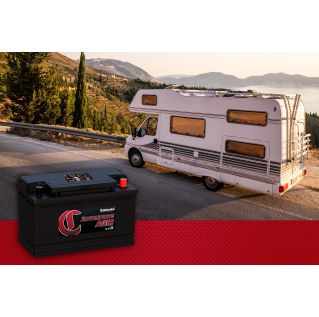You take great care in creating beautiful lawns for your customers. Make sure your equipment is up to the task by caring for the heart of your lawn care equipment — the battery.
In this blog post, we’ll outline five best practices for maintaining lawn and garden batteries to maximize uptime and keep your equipment — and business — running smoothly.
What Are Lawn and Garden Batteries?
Lawn and garden batteries are designed for demanding applications such as tillers, lawnmowers, snow blowers and more. While battery-powered ride-on mowers and tractors have entered the market in recent years, most commercial mowers still rely on gasoline engines.
Similar to your automotive battery, lawn and garden batteries provide the initial boost to start the mower's internal combustion engine and power any electrical components on board, such as lights or digital displays. Like cars, today’s mowers often require more battery power than ever to support features like satellite radio and cruise control.
Don’t wait until you spot signs of trouble or one of your mowers won’t start. These proactive tips can ensure a healthy battery and less downtime all season long.

A reliable ride begins with choosing the best battery for your equipment. Start by referring to the manufacturer's recommendations for your specific lawn tractor or equipment.
Size and voltage. Most ride-on lawnmowers will require a 12-volt battery. A battery’s BCI refers to the physical dimensions of the battery. It also includes the post type and configuration, hold-down type, etc. Lawn and garden batteries are typically in the U1 category.
Terminal position. For a proper fit, your battery needs to have a compatible terminal position. Lawn and garden batteries will be designated U1L or U1R. This refers to where the positive terminal sits on the battery (left or right). While the batteries are identical inside, you may not be able to install a U1L if your connection point is on the right side.
Chemistry. The most common types of batteries used in lawn and garden equipment are flooded, absorbed glass mat (AGM) and lithium-ion batteries. Each has its benefits and drawbacks.
Flooded batteries are typically the least inexpensive and still common among outdoor power equipment batteries. AGM batteries are durable and handle vibration well. Lithium batteries are more expensive but tend to last longer and add less weight to your equipment.
Cold-cranking amps (CCA). Check your manual for specific CCA requirements. Most tractor-mowers require between 150 and 350 CCAs, depending on their size. Other factors to consider are climate, typical terrain and overall usage.
To optimize battery life and extend lifespan, make sure you’re checking your batteries regularly.
Visual inspection. A visual inspection can catch any issues early and allow you to address them. If you see visual irregularities — especially cracks or bulging — it’s important to replace the battery right away to avoid a no-start situation or damage to the equipment. Also, check the terminal connections to ensure they are tight and corrosion-free.
Secure placement. Make sure the battery is secure and strapped down, especially after a particularly bumpy day of mowing.
Testing. Conduct a voltage test at least twice per year before you put equipment away for winter storage and when you bring it back out in the spring. This will help you monitor the battery's life. Use a multimeter or voltmeter to check the battery’s voltage. A healthy battery should have 12.6V or higher when fully charged.
Good battery storage practices will increase the lifespan of your battery and ensure you start the next season out right.
- Remove the battery and store it on a flat, stable surface away from heat or light. Keeping it hooked up inside your mower can cause a slow drain.
- Store in a climate-controlled environment, especially if you live in a climate with freezing temperatures during the off-season.
- Keep the battery from overcharging by using a trickle charger or smart charger.
Just like your car batteries, the batteries in your lawn mower charge while the tractor is in use thanks to the alternator. If your fleet maintains steady work throughout the season, you may not need to charge between jobs. But when batteries sit idle for long periods they will lose charge. In fact batteries can lose about 1% per day while in storage.
To maintain your battery over the off-season, remove it from the mower, make sure it's fully charged and connect it to a trickle charger or smart charger. This ensures your battery maintains a good level of charge but does not overcharge, which can damage the battery.
A lead-acid lawn mower battery has an expected lifespan of between three and five years. It may be time for a replacement if you’re nearing the five-year mark. If you opt for lithium batteries, you can expect a much longer lifespan.
When it’s time to replace your outdoor power equipment batteries, be sure to bring your spent cells to your nearest Continental Battery Systems center for recycling.
Signs of a Dying Lawn and Garden Battery
In addition to regular inspections, watch for these signs that your lawn mower battery needs to be replaced.
- The engine is slow to start or struggles to turn over.
- You hear a clicking sound when you pull the cord or turn the ignition key.
- There are visible signs of wear like bulges or cracks.
- The battery fails a voltage test.
- If the lights or accessories don’t turn on or flicker.
Why Mower Battery Maintenance Matters
Keeping your mower’s battery in top shape is a critical part of your lawn and garden maintenance routine. Poorly maintained batteries will need to be replaced more often, adding to your equipment cost. Further, if you find yourself with a dead or failing battery while out on a job, you’re losing time and money while you wait for a replacement.
But minimizing downtime is just one reason to properly care for your outdoor power equipment batteries. A failing battery forces your mower’s engine to work harder and can take a toll on its electrical system. To avoid unnecessary lawn and garden equipment repair, make sure the heart of your machine is healthy.












